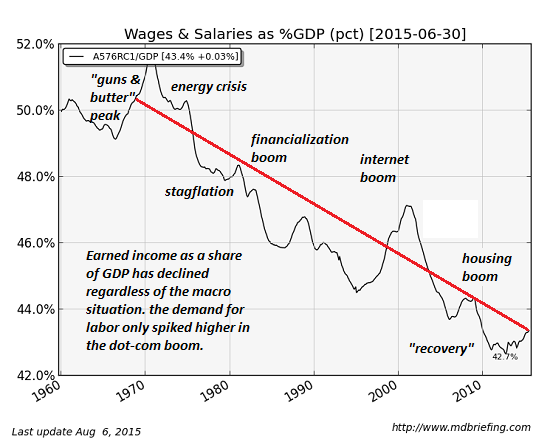This long-term erosion of earned income and household finances does not enable "growth" that is based on rising spending and borrowing.
Why Has Labor's Share of Gross Domestic Product (GDP) been declining for 40 Years? The question cuts right to the heart of the core socio-economic issues of our era: the decline of secure work and the explosive rise of wealth and income inequality.
Over time, economic trends typically reflect macro conditions such as productivity, cost of energy, percentage of the adult population in the work force, etc.
For example: when oil shoots up in price, recessions follow. This is an obvious and well-supported correlation: when households have to spend more income on fuel, they have less to spend on other stuff, and that decline in spending pushes the economy into recession.
But labor's declining share of GDP hasn't reversed course as macro conditions change; labor's share keeps dropping, with brief periods of gains that quickly melt back to the downward-sloping trend line.
Other than the brief 5-year dot-com boom of 1995-2000, labor's share of GDP has dropped for four decades, through recessions and booms alike.
Why does this matter? If wages and salaries--earned income--is a steadily decreasing share of the entire economy, this means household earned income is eroding even when the economy is expanding.
And this is precisely what we see now: household income actually declined 8.5% since 2000 when adjusted for inflation.
How can households pay rising taxes, borrow more money and spend more to support a consumer economy on an income that's shrinking even when the economy is expanding?
Answer: they can't. "Something's gotta give": they can't pay higher taxes, borrow more money (and incur more monthly payments) and spend more on goods and services when their incomes are stagnating. It simply isn't possible.
Interestingly, labor's share of GDP only rose in the brief periods when labor was in strong demand:
1. in the late 1960s "guns and butter" era of Vietnam era military spending and new social-welfare programs
2. in the dot-com era, when building out the Internet created tens of thousands of high-paying jobs
3. in the housing booms of the late 1970s, the late 1980s and the subprime bubble of 2006-2008
In each of these housing-booms, the spike up was muted and short-lived.
The decline in labor's share of GDP in the stagflationary 1970s makes sense--in a long recession-prone environment, businesses will hire fewer people and suppress wage increases.
But what about the booming 1980s, when financialization, housing and the first wave of personal computing all took off? Why would wages/salaries' share of a booming GDP drop so precipitously?
The early 1990s, a time of post-Cold War/post-USSR good feelings, was generally prosperous, as the spike in oil prices from the First Gulf War was short-lived.
That was followed by the once-in-a-century dot-com bubble, which seemed to break the down-trend in labor's share of GDP.
But the dot-com bust phase wiped out all the gains and then some. The subprime housing boom triggered a short-lived, relatively muted rally that reversed as wages/salaries' share of GDP plummeted to new lows in the 2009 recession.
So what factors have persisted through all these changing trends? Two possibilities are:
1. technology that boosts productivity (and thus profits if wages are kept in line) has been steadily becoming cheaper and more powerful.
2. an enduring surplus of low-productivity, low-profitability labor.
As every clock-cycle in CPUs (central processing units) and every byte of memory became cheaper, replacing human labor with automation became increasingly affordable.
As the working-age population expanded (for two reasons--the Baby Boom and women entering the workforce en masse), a surplus of low-productivity labor developed beneath the surface of apparently prosperous eras.
In recessionary eras, job cuts slashed labor's share of GDP but when the economy came back, many of the low-skill, low productivity jobs did not: they'd been automated to lower costs.
These trends kicked into high gear when globalization (i.e. offshore competition and global supply chains) gutted U.S. industries in the 1970s (competition from Japan and South Korea) and again in the 1990s-2000s as competition from China and other emerging economies pressured U.S. corporate costs and profits.
If these factors continue to play out--and I see no reason they won't--we can expect labor's share of GDP to continue its slide as human labor is automated in a highly globalized economy.
This long-term erosion of earned income and household finances does not enable "growth" that is based on rising spending and borrowing. If these are no longer possible, the status quo has no Plan B.
This essay is excerpted from Musings Report 32. The Musings Reports are emailed weekly to subscribers ($5/month) and major contributors ($50+/annually).
NOTE: Contributions/subscriptions are acknowledged in the order received. Your name and email remain confidential and will not be given to any other individual, company or agency.
Thank you, Brandon M. ($10), for your most generous contribution to this site -- I am greatly honored by your support and readership.
| |
Thank you, Rebecca H. ($5/month), for your fabulously generous subscription to this site -- I am greatly honored by your support and readership.
|

























